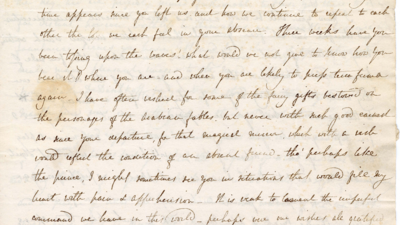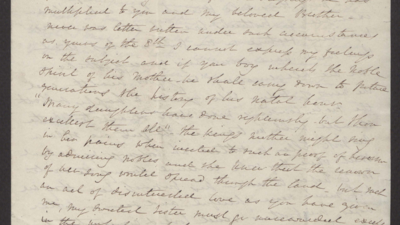Oral History Interview with Anne Dore Russell
Title
Date
Contributor
Summary
Anne Dore Russell, née Weidemann, a non-Jew, was born in Brandenburg, Germany in 1926. She went to school from 1933 to 1945 in Brandenburg. Her father told her about experiences of Germans opposed to Hitler. She knew that her uncle was sent to Sachsenhausen and heard about a Jehovah’s Witness who was imprisoned and later killed for his beliefs. A neighbor who had been a Nazi sympathizer, had a mental breakdown after executing Jews as a soldier on the Eastern Front.
She speaks briefly about Kristallnacht and life in Branderburg under the Nazis. Her father, a civil servant, lost his position in 1933 because he was a Social Democrat and belonged to the Socialist Party (SPD). He told Anne Dore why he opposed the Nazi regime. He avoided using the “Heil Hitler” salute and secretly listened to the BBC (British Broadcasting Company). She learned to be careful in public because of her father’s beliefs. The local police took her father into protective custody in July 1944 during a roundup of men suspected of involvement in a plot to assassinate Hitler.
She mentions the behavior of local Nazis near the end of the war, after which she went to Humbold University in East Berlin and then the Free University in West Berlin.
none
More Sources Like This
of
Rita Harmelin
Rita Harmelin, nee Brauner, was born June 17, 1925 in Bucharest, Romania to Polish-born parents who returned to Poland in 1931. The family moved to Boryslaw an oil town. She describes her secular and religious education and interactions with local Poles and Ukrainians. Rita describes life under Russian occupation September 1939.
Rita's memories of the German invasion of Boryslaw, June 1941 include efforts of local Ukrainians to save Jews. She focuses on successive waves of pogroms encouraged by Germans and carried out by local Poles and Ukrainians. A Jewish quarter or ghetto was established in Boryslaw. There were periodic roundups leading to deportation. BertoldBeitz, a director in the local petrol industry and Mr. Siegemund rescued many Jews, including Rita from the deportations several times. Restrictions increased gradually. Many Jews worked in the Boryslaw petrol industry. A forced labor camp was established in 1943 for the Jewish workers guarded by Ukrainian volunteers. She mentions escape attempts by workers. Rita, her future husband Rolek, and 11 other people went into hiding in the home of a local Ukrainian from March to August 7, 1944 when Russian troops arrived and re-occupied Boryslaw. Her parents were deported before they could accept an offer to hide in a Polish woman’s house. Her mother was killed in Auschwitz, her father survived. Jews from Boryslaw were transported to Plaszow, Poland but the final transport, July 1944 went directly to Auschwitz.
Rita explains why resistance was difficult; the attitude of the Polish underground (ArmiaKrajowa) andmost Ukrainians toward Jews. Her post-war experiences include return to Poland; search for and reunion with her father in Austria in 1945; smuggling herself in and out of Poland. Rita and her father joined her husband (whom she married in Austria) in Australia on January 9, 1949. Rita mentions her guilt as a survivor and how she told her children about her past. She describes life as a Jew in Australia. She gives examples of acts of humanity and compassion by individual non-Jews (Polish, Ukrainian and German).
Interviewee: HARMELIN, Rita Date: April 26, 1992
of
Joseph Schweiger
Joseph (Jóska) Schweiger was born on November, 9, 1912 in the small Hungarian town of Isafiret [phonetic]. His father was an electrical engineer and fought in the Hungarian army in World War I. Josephdescribes how his family identified themselves as Hungarian and spoke Hungarian at home. His parents and he both had Jewish and Gentile friends. Joseph was a sergeant in the Hungarian Coast Guard and trained as a mechanic. He briefly discusses his education and the family’s observance of holidays.
Joseph describes how in 1938 antisemitic laws took hold in Hungary and people were told not to frequent Jewish owned shops. In 1940 his father was sent to a labor camp, but returned after a few months because someone intervened. Joseph describes some kindnesses of a Romanian officer who liked Joseph’s accordion music and did not allow Jews to be transferred while he was in charge. In 1942 Joseph was separated from his parents and two sisters and sent toa labor camp in Hungary. He describes horrible conditions, standing in line 2 hours, scarcity of food, hard labor and beatings by the SS. He describes losing his job in the kitchen for telling the truth about the beatings to an investigator. In 1944 he was deported to Belz,alaborcamp,in the Ukraine. He describes a scene where they were told to work while mortars were reigning down on them.After one or two months, he wasdeported toMauthausen, but does not share many details about his experience there.He describes the death march from Mauthausen to Gunskirchenincluding beatings they received, one of which broke one of his vertebrae, and injury from which he still suffers.
Joseph was liberated in 1945 from Gunskirchen by the American Army and was taken to a hospital in Hörsching. From 1945-1948 Joseph worked for the Jewish underground,Brihah1, aiding refugees to get to Palestine. Brihah sent him to Vienna and then to Salzburg, where Joseph learned to become an auto mechanic. With the help of the Jewish Family Service Joseph, his wife and mother-in-law came to the United States on the SS General Black in 1949. Joseph attributed his survival to his aggressive attitude and determination not to be pushed around.
Joseph found out after the war that his parents and sisters were killed in Auschwitz.
Interviewee: SCHWEIGER, Joseph Date: April 3, 1988
of
Gabriela Truly
Gabriela Truly, née Braun, was born January 7, 1916 in Levoča, Czechoslovakia, where her family had lived since the first half of the 18th century. She and her five siblings were active in Zionist groups. In 1939, as Slovak nationalists allied with the Axis, restrictions were placed on Jews. Her father’s tinsmithing shop was taken over by the State in 1940. In 1942, Mrs. Truly was rounded up with 1000 single girls aged 14-40, from surrounding areas and sent in the first transport to Auschwitz. She describes the dehumanizing intake process and the difficult life in the camps. Later, when mothers were brought with small children to a separate block, her sister and her 4 ½ year old son were among the first to be gassed in Auschwitz. Mrs. Truly describes the drive of self-preservation, of caring only for yourself, although she narrates many incidents in which she aided others and others aided her. Later in 1942, she was moved to Birkenau, and became very ill with typhus, diarrhea and a badly infected foot. In February 1943 she was hospitalized back in Auschwitz. Mrs. Truly categorizes which jobs were easier to survive and which more difficult. Again, aided by a hairdresser named Monsi, she gets a job first knitting for commandant Hoess, then filing in the personnel building. She was told permits to go to Israel had mysteriously come to Auschwitz, but nothing happened. On January 18, 1944, she was taken on a three day death march, and then near Ravensbrück, where she saw her mother for the last time. Next, they were taken to Malchow where she later met up with the younger sister of her sister-in-law. Eventually, she came to Crivitz and witnessed rape by Russian soldiers. Three brothers and one sister with two children had also survived. At last she went to Prague, where in 1948 she left for New York to live with a brother. She married an American-born Jew and remained in New York.
of
Elizabeth Geggel
Elizabeth Geggel1, nee Gutmann, was born on August 2, 1921 in Nuremberg, Germany. She was the older of two daughters born to Heinrich and Marie Guttman. She recalls a happy childhood. Thefamily belonged to a liberal synagogue and observed Jewish holidays. Elizabeth’s father a successful merchant, uneasy about the rise of antisemitism expanded the Swiss branch of his business. In 1931 the family left Germany and moved to St. Gallen, Switzerland. Elizabeth details her extended families’ experiences when Hitler came to power in 1933 (some of her uncles and their families moved to Italy and another unclewas sent to Dachau after Kristallnacht,but her father was able to secure his release.)
Elizabeth’s family became Swiss citizens. She relates that there were few Jews in St. Gallen,but she was active in Swiss and Jewish youth groups: scouts and Habonim. In 1939, when her parents decided to immigrate to the United States, they sent her to Englandto learn English and nursing. Her father took ill and she returned to Switzerland where she worked in a Jewish children’s home. He died in December 1939 but she, her mother and sister did come to the United States.
Mrs. Geggel discusses Mr. Sally Mayer, a Swiss businessman who lived in St. Gallen. Somewhat controversial, he was the head of the Jewish community in Switzerland and represented the American Jewish Joint Distribution Committee from 1940 to 1945. Mayer was involved in a number of schemes to free Jews from concentration camps. Elizabeth looked on him very favorably and thought him very brave to negotiate face to face with Nazis as he did. She relates her mother’s request to Mayer to get an aunt out of Germany (which was successful) and reads a letter from her father-in-law, David Geggel, sent to the Swiss government thanking them for the hospitality extended to him in 1938 when he stayed in Switzerland for a short time until he could go to the United States. Shedescribes the Swiss refugee campswhich housed Austrian refugees until they could get visas to go elsewhere. Elizabeth remembers that the Swiss Jewish community, herself included, helped them with meals and other services. She believes that the Swiss government was also involved in the effort.
Even though they were in Switzerland, Mrs. Geggel recalls that they still felt at risk, especially with the early successes Germany achieved at the start of the war. Her family left Switzerland in 1941, went to Cuba for a short time and finally emigrated to the United States in January 1942.
Nickname: Lisa.

